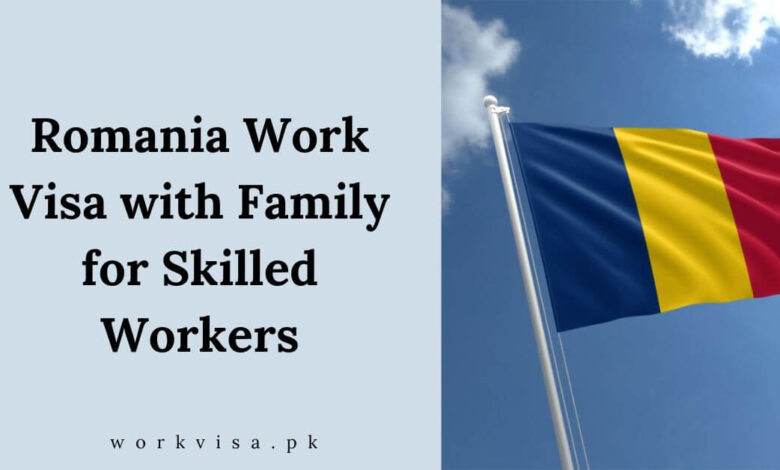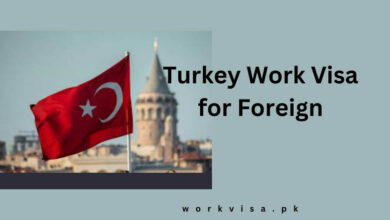Romania Work Visa with Family for Skilled Workers 2025

Romania is a country where medieval fortresses meet modern innovation, a land of opportunity for skilled workers from around the globe. Whether you’re a tech expert, an engineer, or a healthcare professional, Romania offers a growing job market, affordable living, and a rich cultural heritage.
But before embarking on this exciting journey, it’s essential to understand the work visa process.
Check Also: Iceland Work Visa – Application Process
Types of Work Visas Available for Skilled Workers in Romania:
To work legally in Romania, foreign nationals must apply for a work visa. Here’s a breakdown of the main visa types available:
- Work Permit for Permanent Employees:
- This is the most common work visa and is granted to individuals who have secured a permanent position in Romania. Employers must submit a request for the employee to obtain a permit if no Romanian or EU national is available for the job.
- Requirements:
- A job offer from a Romanian employer.
- Proof of qualifications.
- A clean criminal record.
- EU Blue Card:
- The EU Blue Card is for highly skilled workers with a university degree or equivalent professional experience. This visa grants access to the labor market across the European Union.
- Requirements:
- A recognized higher education qualification.
- A job offer with a salary meeting the minimum EU Blue Card threshold.
- Specialized Workers’ Work Permit:
- Designed for workers in specialized fields such as agriculture, tourism, or seasonal labor. This visa is for temporary roles and is often issued for short-term contracts.
- Requirements:
- Proof of employment in a specialized role.
- A work contract that specifies the duration of employment.
- ICT Workers’ Work Visa:
- If you’re an IT professional, this visa is tailored for you. With Romania’s growing tech industry, there is a high demand for skilled IT workers, including software engineers, cybersecurity experts, and data analysts.
- Requirements:
- A job offer in the ICT sector.
- Relevant qualifications and skills.
- Student Work Permit:
- Students coming to Romania for educational purposes can also apply for a work permit to engage in part-time employment during their studies. This is a great option for those looking to gain professional experience while studying.
- Requirements:
- Enrollment in a Romanian educational institution.
- Proof of financial support.
Application Process:
To start the process of applying for a Romanian work visa, follow these steps:
- Obtain a Job Offer: Secure a job with a Romanian employer who is willing to sponsor your visa application. Employers in Romania often help navigate the visa application process.
- Choose the Right Visa: Depending on your role and qualifications, select the appropriate visa category.
- Prepare the Necessary Documents: Your visa application will require several documents, including:
- A valid passport.
- Proof of employment.
- Evidence of accommodation in Romania.
- Proof of financial means.
- Health insurance for the duration of your stay.
- Submit Your Application: Submit your visa application through the Romanian consulate or embassy in your home country or via the Romanian Ministry of Internal Affairs website.
- Wait for Processing: The processing time can vary, but it typically takes several weeks to a few months. Be sure to prepare well in advance.
Benefits:
Romania’s work visa offers a wide range of benefits for skilled workers and their families:
- Legal Residency and Work Authorization:
With a work visa, you are legally allowed to live and work in Romania. - Family Reunification:
Your family can join you under a family reunification visa, which includes spouses and children. - Access to Healthcare:
Romania’s public healthcare system covers employees and their families. - Affordable Cost of Living:
Compared to other EU countries, Romania offers a lower cost of living, making it an attractive destination for families. - Quality Education:
Romania provides access to public and private schools, ensuring your children receive quality education. - Social Security and Tax Benefits:
Workers in Romania are eligible for social security benefits, including retirement pensions and unemployment support.
Where to Find Work Visa Opportunities in Romania:
- EURES (European Employment Services): This European-wide employment platform provides job listings across Romania, including positions eligible for work visa sponsorship.
- BestJobs Romania & eJobs: These local job portals feature numerous positions in high-demand sectors like IT, engineering, healthcare, and construction.
- Public Employment Portal (ANOFM): The official Romanian government portal lists job openings that may qualify for work visa sponsorship.
Can Your Family Accompany You to Romania?
Yes! If you’re a skilled worker in Romania, your family can join you through the Family Reunification Visa. The process generally involves the following steps:
- Submit a Family Reunification Visa Application: Your spouse and children can apply for a long-term visa at the Romanian consulate in your home country.
- Provide Necessary Documents: This includes proof of your relationship (e.g., marriage certificate), evidence of accommodation, health insurance, and proof of financial stability.
- Wait for Approval: The family reunification process may take a few months, so plan ahead.
Conclusion:
Romania is an attractive destination for skilled workers seeking a new career opportunity. The process of obtaining a work visa is straightforward but requires careful planning and attention to detail. By following the outlined steps, securing the right visa, and ensuring all necessary documents are in place, you and your family can start a new chapter in Romania with confidence.
Frequently Asked Questions:
-
Can skilled workers bring their family members to Romania?
Yes, skilled workers can bring their family members through the family reunification visa. This typically includes the spouse and children.
-
What are the requirements for a skilled worker’s family to join them?
Family members must apply for a long-term visa and submit documents proving the relationship, accommodation, financial means, and health insurance.
-
How long does the family reunification process take?
Processing times can vary but typically range from a few weeks to several months.




